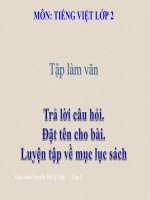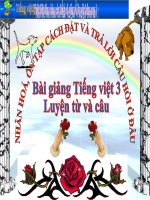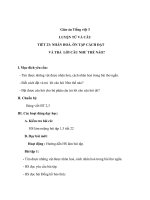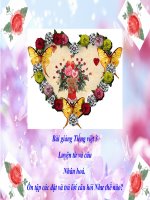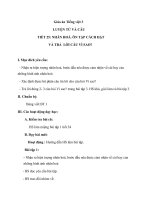Bài tập đọc và trả lời câu hỏi
Bạn đang xem bản rút gọn của tài liệu. Xem và tải ngay bản đầy đủ của tài liệu tại đây (101.1 KB, 6 trang )
BÀI TẬP ĐỌC VÀ TRẢ LỜI CÂU HỎI
I. Read the passage, then answer the questions:
Nguyen Ngoc Truong Son learnt to play chess by watching his parents in
their home. His parents were surprised that Son understood how to play because
little Truong Son was only three years old at the time. Although chess is a difficult
game, a month later he beat his parents at their favorite game. At the age of four,
Truong Son took part in the national young chess championship. Then at seven, he
won a silver medal at the under-nine national chess championship. He was later
chosen to take part in the world young chess championship in Spain in 2000. Now
he is Vietnam's youngest champion. Born in Mekong Delta of Vietnam, Truong
Son is a great surprise to his parents. They are both teachers, earning less than US$
100 a month, and cannot explain how their child can play so well. His father thinks
that Son was perhaps born with the ability and he simply picked it up.
Questions:
1. How did Nguyen Ngoc Truong Son learn to play chess?
2. When did Son take part in the national young chess championship?
3. Where did the World's 2000 chess championship take place?
4. How much do Son's parents earn a month?
II. Read the text and then answer the questions below.
Tropical rain forests are found in Amazon region of South America,
Central America, Africa, and South and Southeast Asia. Rain forests are very
important to the world’s climate. The Amazon rain forest alone receives about 30
to 40 percent of the total rainfall on the earth and produces about the same
percentage of the world’s oxygen. Some scientists believe that the decreasing size
of rain forests will affect the climate on the earth, making it uncomfortable or even
dangerous for life. Saving our rain forests is an international problem. One country
or even a few countries cannot solve the problem alone. The nations of the world
must work together to find a solution before it’s too late.
Questions
1. Where are tropical rain forests found?
2. How are rain forests to the world’s climate?
3. What do scientists think about the decreasing size of rain forest?
4. Is saving our rain forests only a national problem?
III. Read the passage and then answer the questions. (2.5Ms)
Sydney is Australia’s most exciting city. The history of Australia begins
here. In 1788 Captain Arthur Philips arrived in Sydney with 11 ships and 1624
passengers from Britain (including 770 prisoners). Today there are about 3.6
million people in Sydney. It is the biggest city in Australia, the busiest port in the
South Pacific and one of the most beautiful cities in the world. In Sydney, the
buildings are higher, the colors are brighter and the nightlife is more exciting.
There are over 20 excellent beaches close to Sydney and its warm climate and cool
winter have made it a favorite city for immigrants from overseas. There are three
things that make Sydney famous: its beautiful harbor, the Sydney Harbor Bridge,
which was built in 1932 and the Sydney Opera House, which was opened in 1973.
Questions
1
1. Where did Captain Arthur arrive in 1788?
2. Is Sydney the biggest city in Australia?
3. How many beaches are there close to Sydney?
4. What is the population of Sydney today?
5. When was the Sydney Harbor Bridge built?
IV. Read the following passage and answer the questions (2M)
Here is the weather forecast. Today it’s going to be mostly fine with plenty
of sunshine in the south. By the afternoon there will be showers in the west. The
temperature will be between 20
0
C and 22
0
C. Tomorrow morning there will be big
wind throughout the whole country, so be careful on the roads. There may also be
thunderstorm on the east.
* Questions:
1. What’s the weather today going to be like?
2. Will there be a lot of sunshine in the south?
3. How about the east?
4. What will the weather be like tomorrow morning?
5. Will there be any sunshine in the east?
V. Read the passage below carefully and answer the questions. (5 pts)
Sir Winston Churchill (1874 – 1965) was the greatest British statesman of
modern times. During his long, colorful public career, he was a Member of
Parliament for 63 years. He also held almost every government post. And most
important of all, he led the country to victory in World War II. He also wrote many
important books and was a talented painter.
In May 1940, he became Prime Minister. Throughout the war, Churchill
showed great strength and energy. He worked for long periods with little sleep and
traveled many thousands of miles. By courage and determination expressed in his
speeches, he inspired the people of Britain to keep on fighting. In the general
election at the end of the war, the Conservative Party, of which he was the leader,
was defeated. But he became Prime Minister again when he was seventy-seven. He
resigned as Prime Minister in 1955.
Questions
1. When did Churchill first become Prime Minister?
2. By what did he inspire the people of Britain to continue with the fight?
3. How long was he a Member of Parliament?
4. When was his Conservative Party defeated?
5. How old was he when he resigned as Prime Minister?
VI- Read the passage and answer the questions: (3p) Are you looking for a
cheap, clean, effective source of power that doesn't cause pollution or waste
natural resource? Look no further than solar energy from the Sun.
At present, most of our electricity comes from the use of coal and gas, oil or
nuclear power .This power could be provided by the Sun. One percent of the solar
energy that reaches the Earth is enough to provide power for the total population.
Many countries are already using solar energy. Solar panels are placed on the roof
of a house and the Sun's energy is used to heat water .The energy can be stored a
number of days, so on cloudy days you can use solar energy, too.
2
Sweden has an advanced solar energy program. There, all buildings will be
heated by solar energy and cars will use solar power instead of gas by the year
2015.
Questions
1. How long can the solar energy be stored?
2. Where are the solar panels placed?
3. Is the solar energy used in Vietnam now?
VII- Read the passage and answer the questions: (3p)
In many secondary schools in Britain, wearing school uniforms is
compulsory. Some schools argue that there are many disadvantages to this system.
Most students don't agree with school uniform. First when you have to wear
the same clothes as everyone else don't have a change to develop personal
taste in the way you dress. Secondly, people who look scruffy usually look
scruffily in their uniforms too and you can always tell the people who come
from poor homes because their uniforms are not as new or don't fit properly.
Finally, the main reason why most students don't like uniforms is because most
schools choose such colors and styles that don't suit young people at all.
Questions
1. Do most students agree with school uniform?
2. Does wearing casual clothes make students feel comfortable and self -
confident ?
3. What is the main reason that most students don't like school uniforms ?
VIII. Read the passage then answer the questions below. (1.0p)
There are many celebrations throughout the year in Viet Nam, but Tet or the
Lunar New Year is the most important celebration for Vietnamese people. Tet
usually occurs in late January or early February. A few day before Tet is the time
for people to clean and decorate their house. During Tet, people, old and young,
enjoyed special food cooked on the occasion of Tet. It is also the time for family
members to be together.
Questions
1. Are there many celebrations throughout the year in Viet Nam?
2. Which celebration is the most important for Vietnamese people?
3. What do people often do before Tet?
4. Is Tet the time for family reunions?
IX. Read the text carefully, then answer the questions:
My village is about 50 kilometers from the city center. It is very beautiful
and peaceful place and where people grow flowers and vegetables only .It’s very
famous for its roses and picturesque scenery. The air is quite fresh and the smell of
roses makes people feel cool. In spring, my village looks like a carpet with plenty
of colors. Tourists come to visit it so often. Nowadays, with electricity, it doesn’t
take the villagers much time to water the roses. And even at night, people can walk
along the path and enjoy the fresh smell of the flowers.
Questions
1. How far is it from the writer’s village to the city center?
2. What is it famous for?
3
3. Do the people in the village grow rice?
4. Why don’t people nowadays spend much time watering the roses?
5. What can people do at night?
X. Read the passage carefully and answer the questions (2 marks)
Hello, I’m Jimmy. At first, I lived in the country. I used to play in a very
shallow river near my house. But last year, my father got a job in a big city, I
moved there with my family.
Our new house had a garden, but the garden was very small. I’m very happy.
“Is there a river near here?” I asked my mother on the first morning. My mother
answered: “No, there isn’t, but there is a beautiful park near here, Jimmy, and there
is a pool in it. We’ll go there this afternoon.” I was happy then.
After lunch, I and my mother went to the park. I wanted to walk near the
pool. But there was a sign in front of it. My mother read it to me: “WARNING:
This pool is dangerous, 364 people have fallen into it.”
Jimmy looked into the pool carefully. Then I said: “I can’t see them!”
Questions:
1. Where did Jimmy live at first?
2. Did he move to a big city with his family then?
3. Which question did he asked his mother?
4. What did he said at the end of the passage?
XI. Read the passage then answer the questions. (2.5p)
Birthday parties began in Europe centuries ago when people believed that
evil spirits were attracted to people on their birthdays. In order to protect them,
friends and families gathered around the birthday person to offer good wishes,
thoughts and gifts. At first only royalty was thought to be important enough to
warrant a birthday celebration. Eventually, the tradition was expanded to include
children. Almost everyone loves to celebrate his or her birthday and America,
England and Australia share similar customs. A few of the similarities are
birthday candles, lit on a birthday cake. The number of candles equals the age of
the person, with an additional candle to “grow on”.
Questions
1. When did birthday parties begin in Europe?
2. Why did people in Europe celebrate birthday parties?
3. What did families and friends do on birthdays?
4. Which countries share this custom?
5. What is special about the birthday?
XII. Read the text and then answer the questions below (2.5p)
My village is about 50 kilometers from the city center. It is very beautiful
and peaceful place and where people grow flowers and vegetables only .It’s very
famous for its roses and picturesque scenery. The air is quite fresh; however, the
smell of roses makes people feel cool. In spring, my village looks like a carpet
with plenty of colors. Tourists come to visit it so often. Nowadays, with
electricity, it doesn’t take the villagers much time to water the roses. And even at
night, people can walk along the path and enjoy the fresh smell of the flowers.
4
Questions
1. Is it about 50 kilometers from the writer’s village to the city center?
2. What is it famous for?
3. Do the people in the village grow rice?
4. How often do Tourists come to visit the writer’s village?
5. What can people do at night?
XIII. Read the passage below and answer the questions.(1.5P)
Vietnam’s New Year is celebrated according to the lunar calendar. It is
officially known as Tet Nguyen Dan or Tet. It begins between January the twenty-
first and February the nineteen. The exact date changes from year to year.
Vietnamese people usually make preparations for the holiday several weeks
beforehand. They tidy their houses, cook special food, clean and make offerings on
the family altars. On the New Year’s Eve, people sit up to midnight to see New
Year in, and then they put on new clothes and give one another the greetings of the
season. Tet lasts ten days. The first three days are the most important. Vietnamese
people believe that how people act during those days will influence the whole year.
As a result, they make every effort to avoid arguments and smile as much as
possible.
Questions
1. What is Vietnam’s New Year known as?
2. When does the Lunar New Year start?
3. What do Vietnamese people usually do to prepare for Tet?
4. How long does the Lunar New Year last?
5. Why are the first three days the most important?
6. What do people try to avoid and try to do on the first three days?
XIV. Read the text carefully then answer the questions. (2.0p)
You ask me what I think about my dad. Great! I must tell you my dad is the
best person in the world. Do you know what I mean? He is a considerate and
generous man who is love not only by all his friends but also by all his family. His
sense of humor distinguishes from others. In a word, my dad is terrific. I'm so
proud of him and love him so much.
Questions
1. Who do you think the writer sends this postcard to?
2. What does he think about his father?
3. What quality makes his father different from others?
4. Is he so proud of his father?
XV. Read then answers the questions. (2.0p)
Passover is in late March or early April. This festival is celebrated in Israel
and by all Jewish people. On this festival, people celebrate freedom from slavery.
Passover is also an ancient spring festival. On the first and second nights of
Passover, Jewish families eat special meal called the Seder. Easter is a joyful
festival which is celebrated in many countries. It happens at around the same time
as Passover. On Easter day (Easter Sunday), young children receive chocolate or
sugar eggs as long as they are good. In many countries, people crowd the streets to
watch colorful parades.
Questions
5
1. Where is Passover celebrated?
2. Who is it celebrated by?
3. How are the parades on Easter?
4. What do children get on Easter Sunday?
XVI. Read the passage carefully and answer the questions (2 marks)
Tom lived in the big city, and he loved playing in a park near his house; but
then his father got a job in an other city, he moved there with his family.
Their new house had a garden, but the garden was very small. Tom wasn’t
very happy, “Is there a river near here?” he asked his mother on the first morning.
His mother answered: “No, there isn’t, but there is a beautiful park near here, Tom,
and there is a pool in it. We’ll go there this afternoon.” Then Tom was happy.
After lunch, Tom and his mother went to the park. Tom wanted to walk near
the pool. But there was a sign in front of it. His mother read to him: “WARNING:
This pool is dangerous, 364 people have fallen into it.”
Tom looked into the pool carefully. Then he said: “I can’t see them!”
Questions:
1. Where did Tom live at first?
2. Did he move to the country side with his family then?
3. Which question did he asked his mother?
4. What did he said at the end of the passage?
XVII. Read the following passage carefully, then make questions from the
suggestions and answer them.
We can develop alternative sources of energy, and unless we try we’ll never
succeed. Instead of burning fossil fuels we should be concentrating on more
economic uses of electricity, because electricity can be produced from any sources
of energy.
If we didn’t waste so much energy, our resources would last longer. We can
save more energy by conservation than we can produce for the same money.
Unless we do research on solar energy, wind power, tidal power, hydroelectric
plants our fossil fuels will run out and we’ll all freeze or starve to death.
Many countries are spending much more time and money on research because
the energy from the sun, the waves and the winds last forever. We really won’t
survive unless we start working on cleaner and safer sources of energy.
1. What can electricity be produced from?
2. What would happen if we didn’t waste so much energy?
3. What will happen unless we do research on solar energy, wind power, tidal
power, hydroelectric plants ?
4. Why are many countries spending much more time and money on research?
5. What will happen unless we start working on cleaner and safer sources of
energy?
6


